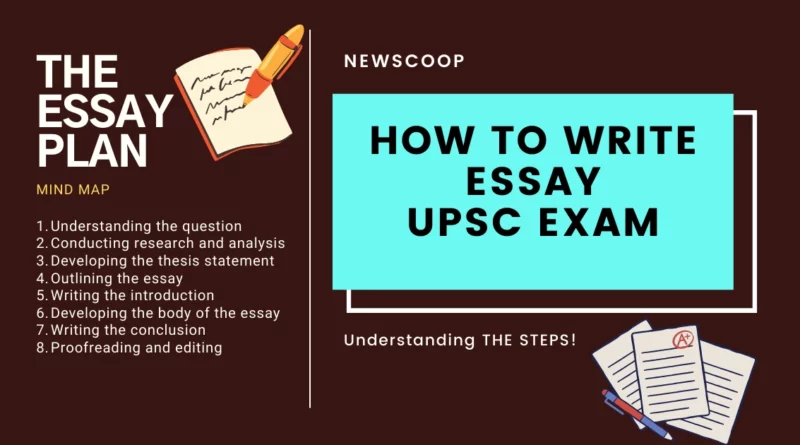How to Write a Philosophical Essay | UPSC 100%
How to Write a Philosophical Essay for UPSC Exam
Writing a philosophical essay can be a challenging task, especially when it comes to the UPSC Civil Services Examination. Philosophical essays require a deep understanding of concepts and theories, critical thinking skills, and a clear and concise writing style. In this article, we will provide you with a step-by-step guide on how to write a philosophical essay for UPSC.
Steps to Write a Philosophical Essay for UPSC Exam
Following are the steps to write a philosophical essay for UPSC:
- Understanding the question
- Conducting research and analysis
- Developing the thesis statement
- Outlining the essay
- Writing the introduction
- Developing the body of the essay
- Writing the conclusion
- Proofreading and editing
I. Understanding the question
The first and most crucial step in writing a philosophical essay is to understand the question. You should read the question carefully, and make sure you understand what it is asking you to do. Underline the key terms and phrases, and identify the main theme or topic of the essay. It is essential to understand the question and its nuances before moving on to research and analysis.
II. Research and Analysis
Once you have understood the question, the next step is to conduct research on the topic. A well-researched essay demonstrates your depth of understanding of the topic and helps you develop a strong argument. Read widely, and gather information from different sources such as books, journals, and articles. Take notes and highlight the key points, arguments, and counterarguments. Analyze the information critically, and evaluate the strengths and weaknesses of different arguments.
It is crucial to analyze the research and form your own opinions and conclusions. You should question the assumptions underlying the arguments and critically evaluate the evidence presented. Developing a nuanced understanding of the topic is essential to writing a good philosophical essay.
III. Developing the thesis statement
The thesis statement is the central argument or main point of your essay. It should be a clear and concise statement that summarizes your position on the topic. Your thesis statement should be based on your analysis of the research and should be supported by evidence. It is essential to take your time and develop a strong thesis statement as it guides the rest of your essay.
IV. Outlining the essay
An outline is a roadmap that helps you organize your thoughts and ideas. It is essential to have a clear and logical structure for your essay. Your outline should include the introduction, body, and conclusion. The introduction should provide the background information and context for your essay. The body should include the main arguments and evidence, and the conclusion should summarize your main points and restate your thesis statement.
A well-structured outline helps you stay on track and ensures that you include all the relevant information in your essay. It also helps you avoid rambling and tangential arguments, which can distract from your main thesis.
V. Writing the introduction
The introduction is the first paragraph of your essay, and it should grab the reader’s attention and provide them with the context and background information. It should also introduce your thesis statement and provide a brief overview of the main arguments that you will be making in the essay. The introduction should be engaging and informative, providing the reader with a clear understanding of what the essay is about.
VI. Writing the body
The body of your essay should be well-structured and should present your arguments and evidence in a logical and coherent manner. Each paragraph should focus on a single idea or argument, and it should be supported by evidence. Use transitional phrases to connect your paragraphs and create a flow in your writing. It is essential to structure your arguments in a logical sequence and avoid jumping between arguments.
Each argument should be presented clearly and concisely, with evidence supporting your claims. You should also consider counterarguments and present them in a fair and balanced manner. A strong body demonstrates your depth of understanding of the topic and supports your thesis statement.
VII. Writing the conclusion
The conclusion is the last paragraph of your essay, and it should summarize your main points and restate your thesis statement. It is essential to end your essay with a strong conclusion that leaves a lasting impression on the reader. You should avoid introducing new arguments or evidence in the conclusion and focus on summarizing the main points of your essay.
You can also consider including a broader perspective or implications of your arguments. This can help contextualize your arguments and demonstrate their relevance beyond the immediate topic of the essay. A well-written conclusion is a powerful tool that can leave a lasting impression on the reader.
VIII. Proofreading and editing
Proofreading and editing are essential steps in any writing process. Once you have written your essay, take a break, and come back to it later with fresh eyes. Read your essay aloud and look for grammatical errors, typos, and spelling mistakes. Ensure that your arguments are logical and well-supported and that your writing is clear and concise.
Editing is also an opportunity to refine your writing style and improve the coherence and flow of your essay. It is essential to make sure that your writing is easy to read and understand. You can also consider asking a friend or colleague to read your essay and provide feedback.
IX. Conclusion
Writing a philosophical essay for UPSC requires a deep understanding of the concepts and theories, critical thinking skills, and a clear and concise writing style. Understanding the question, conducting research and analysis, developing the thesis statement, outlining the essay, writing the introduction, body, and conclusion, and proofreading and editing are essential steps in the writing process.
Following these steps can help you write a well-structured and persuasive essay that demonstrates your depth of understanding of the topic. A well-written philosophical essay can showcase your critical thinking and writing skills and help you stand out in the UPSC Civil Services Examination.
Thank You!

